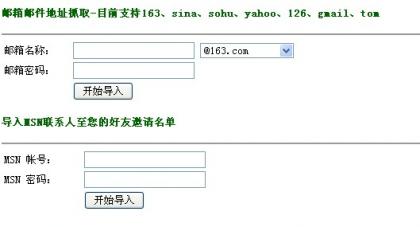PHP获取邮箱联系人地址 PHP获取163、gmail、126等邮箱联系人地址【已测试2009.10.10】
人气:0想了解PHP获取163、gmail、126等邮箱联系人地址【已测试2009.10.10】的相关内容吗,在本文为您仔细讲解PHP获取邮箱联系人地址的相关知识和一些Code实例,欢迎阅读和指正,我们先划重点:PHP,邮箱地址,下面大家一起来学习吧。
在网上找了一些,大部分都已经失效,为此我重新整理了一下;特别放出126的代码,163是比较容易抓取的;126有点变态多了一次跳转,比较麻烦复制代码 代码如下:
<?php
/**
* @file class.126http.php
* 获得126邮箱通讯录列表
* @author jvones<jvones@gmail.com> http://www.jvones.com/blog
* @date 2009-09-26
**/
class http126
{
private function login($username, $password)
{
//第一步:初步登陆
$cookies = array();
$ch = curl_init();
curl_setopt($ch, CURLOPT_SSL_VERIFYPEER, false);
curl_setopt($ch, CURLOPT_URL, "https://reg.163.com/logins.jsp?type=1&product=mail126&url=http://entry.mail.126.com/cgi/ntesdoor?hid%3D10010102%26lightweight%3D1%26verifycookie%3D1%26language%3D0%26style%3D-1");
curl_setopt($ch, CURLOPT_POST, 1);
curl_setopt($ch, CURLOPT_POSTFIELDS, "username=".$username."@126.com&password=".$password);
curl_setopt($ch, CURLOPT_COOKIEJAR, COOKIEJAR);
curl_setopt($ch,CURLOPT_HEADER,1);
curl_setopt($ch, CURLOPT_TIMEOUT, TIMEOUT);
curl_setopt($ch, CURLOPT_RETURNTRANSFER, true);
$str = curl_exec($ch);
//file_put_contents('./126result.txt', $str);
curl_close($ch);
//获取redirect_url跳转地址,可以从126result.txt中查看,通过正则在$str返回流中匹配该地址
preg_match("/replace\(\"(.*?)\"\)\;/", $str, $mtitle);
$_url1 = $mtitle[1];
//file_put_contents('./126resulturl.txt', $redirect_url);
//第二步:再次跳转到到上面$_url1
$ch = curl_init($_url1);
curl_setopt($ch, CURLOPT_TIMEOUT, TIMEOUT);
curl_setopt($ch, CURLOPT_RETURNTRANSFER, true);
curl_setopt($ch,CURLOPT_COOKIEFILE,COOKIEJAR);
curl_setopt($ch, CURLOPT_COOKIEJAR, COOKIEJAR);
curl_setopt($ch,CURLOPT_HEADER,1);
$str2 = curl_exec($ch);
curl_close($ch);
if (strpos($contents, "安全退出") !== false)
{
return 0;
}
return 1;
}
/**
* 获取邮箱通讯录-地址
* @param $user
* @param $password
* @param $result
* @return array
*/
public function getAddressList($username, $password)
{
if (!$this->login($username, $password))
{
return 0;
}
$header = $this->_getheader($username);
if (!$header['sid'])
{
return 0;
}
//测试找出sid(很重要)和host
//file_put_contents('./host.txt', $header['host']);
//file_put_contents('./sid.txt', $header['sid']);
//开始进入模拟抓取
$ch = curl_init();
curl_setopt($ch, CURLOPT_URL, "http://".$header['host']."/a/s?sid=".$header['sid']."&func=global:sequential");
curl_setopt($ch, CURLOPT_COOKIEFILE, COOKIEJAR);
curl_setopt($ch, CURLOPT_HTTPHEADER, array("Content-Type: application/xml"));
$str = "<?xml version=\"1.0\"?><object><array name=\"items\"><object><string name=\"func\">pab:searchContacts</string><object name=\"var\"><array name=\"order\"><object><string name=\"field\">FN</string><boolean name=\"ignoreCase\">true</boolean></object></array></object></object><object><string name=\"func\">user:getSignatures</string></object><object><string name=\"func\">pab:getAllGroups</string></object></array></object>";
curl_setopt($ch, CURLOPT_POST, 1);
curl_setopt($ch, CURLOPT_POSTFIELDS, $str);
curl_setopt($ch, CURLOPT_TIMEOUT, TIMEOUT);
ob_start();
curl_exec($ch);
$contents = ob_get_contents();
ob_end_clean();
curl_close($ch);
//get mail list from the page information username && emailaddress
preg_match_all("/<string\s*name=\"EMAIL;PREF\">(.*)<\/string>/Umsi",$contents,$mails);
preg_match_all("/<string\s*name=\"FN\">(.*)<\/string>/Umsi",$contents,$names);
$users = array();
foreach($names[1] as $k=>$user)
{
//$user = iconv($user,'utf-8','gb2312');
$users[$mails[1][$k]] = $user;
}
if (!$users)
{
return '您的邮箱中尚未有联系人';
}
return $users;
}
/**
* Get Header info
*/
private function _getheader($username)
{
$ch = curl_init();
curl_setopt($ch, CURLOPT_URL, "http://entry.mail.126.com/cgi/ntesdoor?hid=10010102&lightweight=1&verifycookie=1&language=0&style=-1&username=".$username."@126.com");
curl_setopt($ch, CURLOPT_COOKIEFILE, COOKIEJAR); //当前使用的cookie
curl_setopt($ch, CURLOPT_COOKIEJAR, COOKIEJAR); //服务器返回的新cookie
curl_setopt($ch, CURLOPT_RETURNTRANSFER, true);
curl_setopt($ch, CURLOPT_HEADER, true);
curl_setopt($ch, CURLOPT_NOBODY, true);
$content=curl_exec($ch);
preg_match_all('/Location:\s*(.*?)\r\n/i',$content,$regs);
$refer = $regs[1][0];
preg_match_all('/http\:\/\/(.*?)\//i',$refer,$regs);
$host = $regs[1][0];
preg_match_all("/sid=(.*)/i",$refer,$regs);
$sid = $regs[1][0];
curl_close($ch);
return array('sid'=>$sid,'refer'=>$refer,'host'=>$host);
}
}
?>

加载全部内容